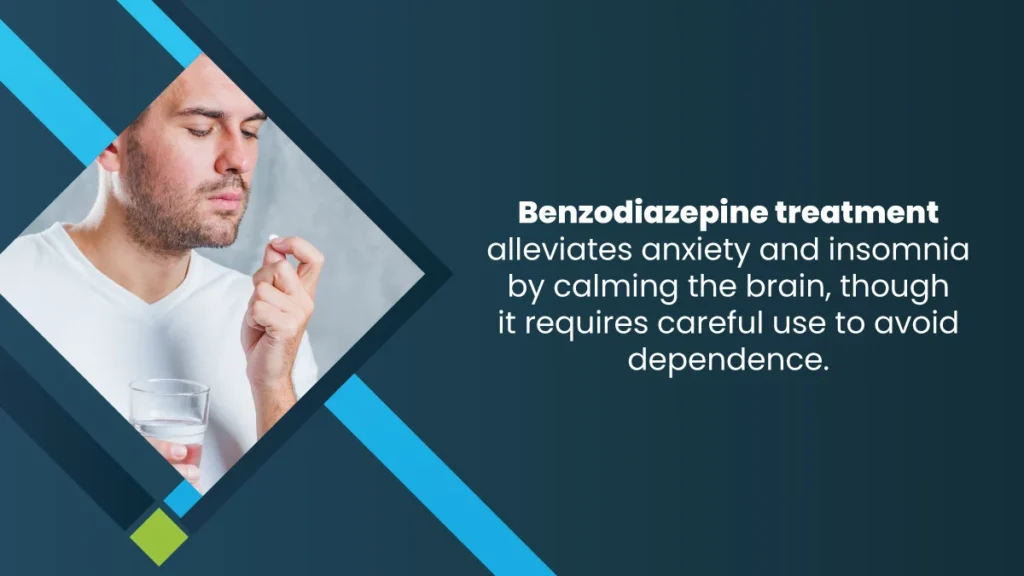Benzodiazepines are a type of medication used to treat anxiety, insomnia, and other conditions. They work by calming the brain and nerves and helping people relax. While effective, these drugs come with important considerations and potential risks.
Understanding their use and effects is vital for anyone considering or currently using benzodiazepines. This blog will uncover essential facts about benzodiazepine treatment, providing clear and helpful information.
Key Takeaways
Benzodiazepine treatment helps manage anxiety and sleep disorders by calming the brain and nerves. Here’s what you should know:
- Benzodiazepines enhance the effects of GABA neurotransmitters, reducing brain activity and promoting relaxation.
- Benzodiazepines are usually administered orally, with dosage adjusted based on the specific condition and patient response.
- Benzodiazepines effectively relieve anxiety and insomnia, but long-term use can lead to dependence and drowsiness.
The Haven Detox-New Jersey offers comprehensive benzodiazepine treatment. Call us at (856) 565-3102 to learn more about our treatment.

Overview Of Benzodiazepine Treatment
Benzodiazepines are a class of drugs that help treat anxiety, insomnia, and seizures. They work by soothing the brain and nerves. Doctors often prescribe them for short-term use to manage severe symptoms. Long-term use can lead to addiction or withdrawal issues.
These medications include well-known drugs like Valium and Xanax. They enhance the effects of a brain chemical called GABA, which reduces nerve activity. By boosting gamma-aminobutyric acid (GABA), benzodiazepines help to relieve stress and promote relaxation. They are usually taken orally in pill form.
Despite their effectiveness, benzodiazepines have risks. Misuse or prolonged use can cause tolerance and drug addiction. Following the prescribed dosage is essential, and not stopping suddenly without consulting a doctor. Proper management helps to minimize potential problems associated with these drugs.
Mechanism Of Action
Benzodiazepines, commonly prescribed for anxiety and sleep issues, work by interacting with specific receptors in the brain. These drugs affect the central nervous system, leading to calming effects. They are often used for a short period due to the risk of dependence and overdose. Understanding their mechanism helps in safe use and management.
Pharmacodynamics
Pharmacodynamics refers to how benzodiazepine drugs affect the body. These medications, including short-acting and long-acting benzos, modulate neurotransmitter activity in the brain. By enhancing the effects of certain neurotransmitters, they produce calming effects, making them effective for treating muscle spasms and anxiety. Daily doses need careful management to avoid dependence.
Interaction With GABA Receptors
Benzodiazepines interact with GABA receptors in the brain, which play a vital role in calming the central nervous system. By enhancing GABA’s effects, these drugs reduce anxiety and muscle spasms. This interaction helps explain their widespread use and effectiveness. However, patients must be cautious due to the risk of overdose and dependence.
Neurotransmitter Modulation
Benzodiazepines modulate neurotransmitters, influencing how the brain’s signals are transmitted. By affecting substances like GABA, they help reduce anxiety and promote relaxation. This modulation is crucial for their effectiveness but also highlights the need for careful dosing. Misuse or overuse can lead to dependence and other risks.
Indications For Use
Benzodiazepines are a class of medications commonly used to treat various medical conditions due to their calming effect. While they offer relief and improve quality of life, it’s crucial to understand their appropriate uses and potential risks, especially with long-term treatment.
Anxiety Disorders
Benzodiazepines are effective for treating anxiety disorders. They help manage symptoms like excessive worry and panic attacks. These medications work on benzodiazepine receptors in the brain, providing a calming effect. However, long-term use may cause cognitive impairment and a higher risk of substance use disorder.
Insomnia
Benzodiazepines are used for the treatment of insomnia, especially when other options fail. They help people fall asleep faster and stay asleep longer. Short-acting benzos are preferred for sleep disorders to avoid daytime drowsiness. Prolonged use can lead to dependence and adverse effects.
Seizure Disorders
For managing seizure disorders, benzodiazepines can be an effective treatment option. They help control severe withdrawal symptoms and reduce seizure frequency. High doses may be required initially but can lead to a higher risk of side effects. Regular monitoring is essential to avoid adverse effects.
Muscle Spasms
Benzodiazepines can relieve muscle spasms, offering short-term relief from severe pain. They work by calming the nervous system, which helps reduce muscle tension. Long-term use should be circumvented due to potential cognitive impairment and the risk of dependence. Alternatives may be considered for ongoing treatment.
Alcohol Withdrawal
In alcohol withdrawal management, benzodiazepines help ease severe withdrawal symptoms. They reduce the risk of complications like seizures and delirium. However, people with substance use disorder need careful monitoring to prevent misuse. Treatment should be tailored to each individual’s needs for optimal results.
Administration And Dosage
When it comes to benzodiazepine treatment, understanding administration and dosage is crucial for ensuring safety and effectiveness. Benzodiazepines come in various forms and require careful dosing. Medical professionals play a significant role in determining the appropriate treatment plan, considering factors like age, dosage, and potential side effects.
Forms Of Administration
Benzodiazepines can be administered in various forms, including oral tablets, capsules, and liquid solutions. Each form has different onset times and absorption rates. Oral pills are commonly prescribed in the United States for convenience. Medical professionals select the form based on the patient’s medical condition and needs.
Standard Dosage Guidelines
Standard dosage guidelines for benzodiazepines vary depending on the medication and patient factors. Initial doses are generally lower to minimize risks, such as respiratory depression and benzodiazepine addiction. Long-term use of benzodiazepines requires careful monitoring by medical professionals to adjust dosages and prevent drug overdose.
Pediatric And Geriatric Considerations
When prescribing benzodiazepines to pediatric or geriatric patients, special care is needed. These age groups may have different responses and higher risks of side effects. Pediatric and geriatric patients may require adjusted dosages and closer monitoring. Medical professionals must carefully evaluate treatment options and consider risks like benzodiazepine overdose.
Efficacy Of Benzodiazepine Treatment
Benzodiazepines are commonly prescribed for anxiety and insomnia, offering quick relief for many patients. Their effectiveness in treating short-term symptoms is well-documented, but concerns about long-term use and addiction arise. Exploring their short-term and long-term efficacy and comparisons with other treatments helps us understand their role in effective medical care.
Short-term Efficacy
Benzodiazepines are effective for short-term relief of anxiety and insomnia. They work quickly to reduce symptoms, making them useful for immediate treatment. However, higher doses can lead to side effects and potential addiction. Short-term use helps some patients manage acute issues but should be monitored closely.
Long-term Efficacy
Long-term benzodiazepine use can lead to an increased risk of benzo addiction and side effects. Prolonged use often results in tolerance, meaning higher doses are needed. For elderly patients, long-term therapy can cause memory issues and fall risks. The risks may outweigh the benefits, especially with extended use.
Comparative Studies With Other Treatments
Comparative studies show that benzodiazepines may be less effective long-term compared to tricyclic antidepressants or other treatments. Benzodiazepines have a higher risk of misuse and addiction. Alternative treatments can offer better long-term outcomes with fewer risks, making them a preferred choice for some patients.
Side Effects And Risks Of Benzodiazepine Treatment
Benzodiazepines, like prescription medications for panic disorder, can have serious side effects. Patients on long-term benzodiazepine therapy face an increased risk of overdose. Misuse of benzodiazepines and recreational use can lead to substance abuse and fatal overdose. Family members and treatment facilities must be aware of these risks.
Using benzodiazepines can also lead to benzodiazepine use disorder. Nonmedical use and stronger withdrawal symptoms are significant risks. These medications are often misused for their calming effects, which can result in a need for professional help and medical treatment. The risk of a suicide attempt increases with improper use.
The effects of benzodiazepines include sedation and impaired judgment. This can contribute to dangerous behaviors and accidents. Proper management of prescription benzodiazepines is crucial to avoid these risks. Understanding and monitoring these side effects can help prevent serious health issues.
Frequently Asked Questions (FAQ)
What are benzodiazepines used for?
Benzodiazepines are medications often used to manage anxiety, insomnia, and seizures. They work by calming the brain and nervous system, providing relief from these conditions. These drugs are also prescribed to help with muscle spasms and withdrawal symptoms from alcohol.
Though effective, benzodiazepines can cause dependence if used for extended periods. They are usually recommended for short-term use, and following a doctor’s instructions is crucial to avoid potential issues. They may also be used in treating panic disorders and certain other conditions. Always consult a healthcare provider for proper usage and possible side effects.
What conditions are typically treated with benzodiazepines?
Benzodiazepines treat various conditions by calming the central nervous system. They are commonly prescribed for anxiety disorders, such as generalized anxiety disorder and panic attacks, because they help reduce excessive nervousness and tension. These medications also address insomnia by promoting relaxation and improving sleep quality.
Additionally, benzodiazepines can be used to manage muscle spasms and seizures. They enhance the effects of a GABA neurotransmitter, which helps inhibit brain activity. Although benzodiazepines are effective, they carry a risk of dependence and should be used carefully under medical supervision to avoid potential abuse and side effects.
How long is it safe to use benzodiazepines for treatment?
Benzodiazepines are typically safe for short-term use, usually up to two to four weeks. Prolonged use can lead to dependence and tolerance, meaning the medication may become less effective over time. Doctors often recommend them for temporary relief of severe anxiety or insomnia.
For more extended treatment, alternative therapies or medications are usually advised to avoid risks associated with long-term benzodiazepine use. Always follow your doctor’s guidance and discuss any concerns about the duration of your treatment. Regular check-ins with your healthcare provider help ensure the medication remains safe and effective.
Transform Your Health: The Haven Detox-New Jersey
Are you looking for drug addiction treatment? At The Haven Detox-New Jersey, we offer comprehensive services to support your recovery journey.
Our drug detox program helps you safely eliminate harmful toxins from your system, minimizing withdrawal symptoms. For those needing structured support, our residential rehab provides a nourishing environment where you can focus on healing and overcoming dependency.
We also offer vital nutrients and NAD IV therapy, which helps restore essential nutrients and hydration to support your overall well-being during treatment.Contact us today at (856) 565-3102 to learn how we can help you or your loved one achieve a healthier, drug-free life.

